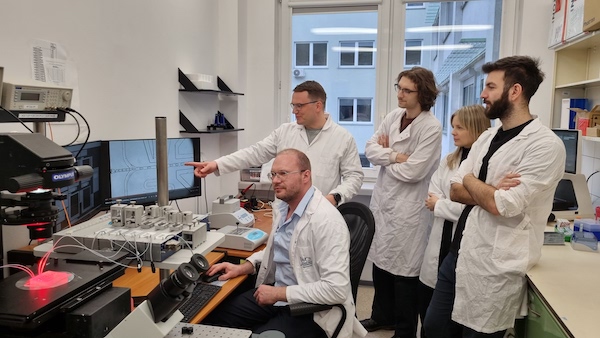Dr Tomasz Kamiński as a co-author of a grant project funded in TEAM NET FENG call

19 02 2025
Scientists from the Department of Molecular Biology of our Faculty, led by Dr. Tomasz Kamiński, in collaboration with teams from Adam Mickiewicz University in Poznań (Prof. Małgorzata Borowiak, project leader) and Jagiellonian University (Prof. Józef Dulak), have secured funding for the project “Development of an Innovative, High-Throughput Platform for Functional Screening of Human Pancreatic Endocrine Cells” under the first TEAM NET FENG programme organized by the Foundation for Polish Science.
The awarded funding amounts to PLN 12,344,749.02, of which PLN 4,199,113.25 will go to the team from the Faculty of Biology at the University of Warsaw.
Diabetes is one of the most significant global health challenges, with its complications being a major cause of mortality. The search for new therapies is hindered by insufficient methods for studying disease mechanisms and testing potential treatments. According to current standards, cell-based in vitro tests are increasingly used in place of animal models. In response to these challenges, the research consortium has designed a platform for screening human pancreatic endocrine cells. Obtaining β cells, which secrete insulin in response to increased glucose levels, remains a key challenge, as current methods fail to produce β cells in sufficient quantity and quality.
The team of Prof. Małgorzata Borowiak from the Faculty of Biology at Adam Mickiewicz University in Poznań (project leader) will first optimize their protocols for the proliferation and differentiation of induced pluripotent stem cells (iPSCs) into human β cells. Achieving full functionality of β cells requires interaction with their microenvironment, including endothelial cells, which will be obtained by the team of Prof. Józef Dulak and Prof. Agnieszka Łoboda from the Faculty of Biochemistry, Biophysics, and Biotechnology at Jagiellonian University. Dr. Tomasz Kamiński’s team from the Faculty of Biology UW will develop a high-throughput microfluidic platform for culturing and studying pancreatic endocrine and endothelial cells in a microculture format. The entire consortium will then use this technology in screening analysis to identify new mechanisms of differentiation and proliferation of human pancreatic endocrine cells.
The developed solutions and technologies will be valuable for both biotechnology companies and researchers studying diabetes mechanisms and seeking novel therapeutic approaches.